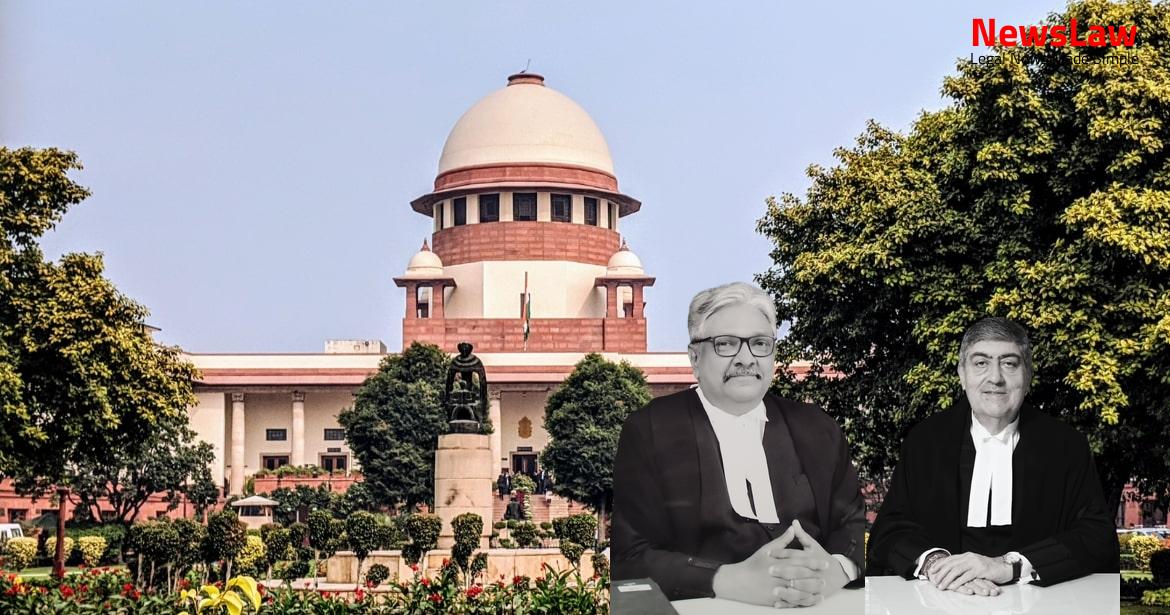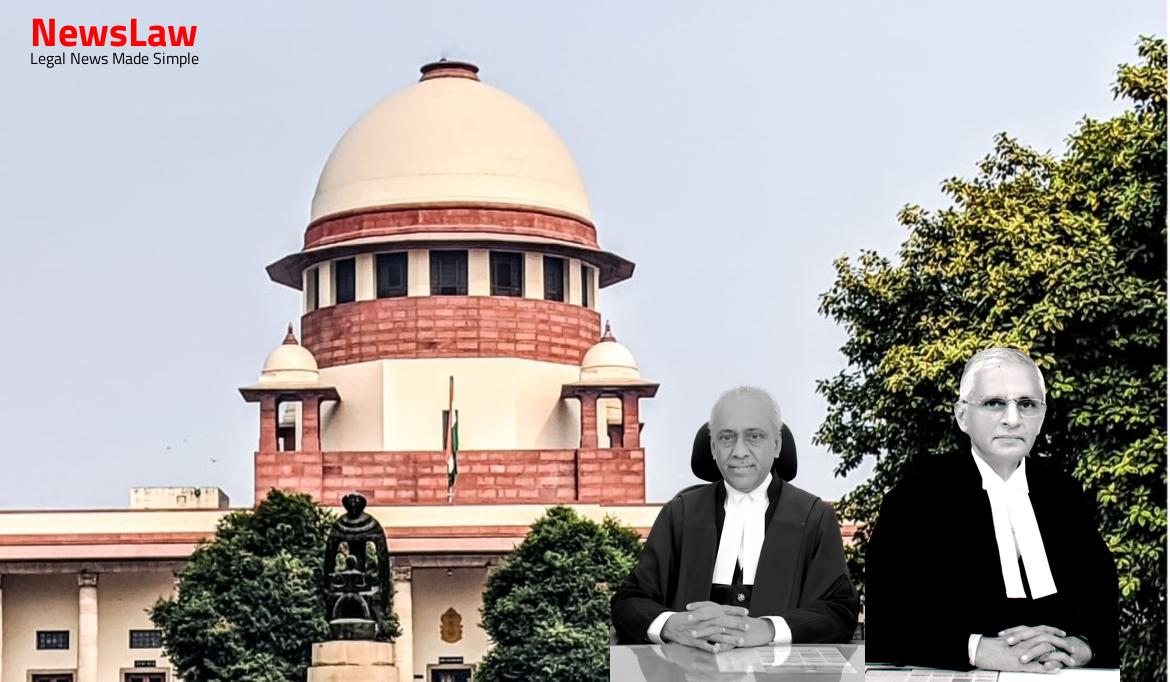The Supreme Court recently rendered a crucial decision in the case of Chhabildas v. State of Maharashtra, concerning land reservation and acquisition. The case delves into the intricate provisions of the Maharashtra Regional and Town Planning Act, 1966, impacting the rights of both the appellants and the first respondent. Stay tuned to understand the legal intricacies surrounding land designation lapsing, acquisition notices under Section 127, and compliance with statutory timelines in the realm of town planning schemes and development plans.
Facts
- Appellants’ property was reserved for a shopping complex and vegetable market in the Development Plan.
- They filed a Writ Petition seeking to quash the reservation and declare the land free for their use.
- Appellants are owners of 0.52 hectares of land and objected to the reservation.
- A draft acquisition was dropped due to lack of funds, and a proposal for layout regularization was submitted.
- Previous owners had issued a notice under Section 127 of the Act for land acquisition.
- Municipal Council’s meeting was held on 15.02.2005 regarding the land.
Also Read: Analyzing Legal Reasoning in a Poisoning Death Case
Arguments
- Shri Naphade, learned Senior Counsel, argued that the Development Plan reserving the appellants’ property dates back to 1984.
- Due to no action under Section 127, the appellants’ property must be freed from the reservation.
- Referring to the case Chhabildas v. State of Maharashtra, he emphasized the necessity of notice under Section 127.
- The appellants are being unfairly treated by strictly adhering to the law in Section 127 of the Act.
- Citing the case Bhavnagar University v. Palitana Sugar Mill, he criticized the High Court’s reasoning on the revised Scheme’s effect under Section 38 as fallacious.
- The argument put forth by the learned Counsel on behalf of the first respondent is that the impugned judgment is legally sound.
- The first respondent’s Counsel emphasized that the predecessors in interest of the appellants were the ones who received the notice issued under Section 127 of the Act.
- The Counsel for the first respondent contends that justice has already been served based on the legal premises of the case.
Also Read: Analysis of Circumstantial Evidence in Criminal Case
Analysis
- Section 127 of the Act pertains to the acquisition of lands for public purposes related to town planning schemes.
- The judgment emphasizes the importance of Section 127 in the context of land acquisition.
- The court specifically refers to paragraph 38 of the judgment, highlighting the relevance of Section 21 in relation to land designation lapsing.
- It is noted that the draft revised plan alone does not automatically revive the designation of land, which lapses as per Section 20.
- Section 20 is interpreted as not intending to diminish the landowner’s right under Section 22 to unfreeze the land.
- The judgment reflects on the legislative intent behind Sections 20, 21, and 22 of the Act in the context of land designation and ownership rights.
- The case involved the interpretation and application of various sections of the Maharashtra Regional and Town Planning Act, 1966.
- The judgment discussed the provisions related to regional plans, development plans, and town planning schemes under the Act.
- It highlighted the significance of issuing purchase notices under Section 127 after specific timeframes as per the Act.
- The court emphasized the importance of following statutory procedures related to land acquisition and reservation lapsing under Section 127.
- Specific instances from past cases were cited to support the argument about reservation lapsing due to inordinate delays or non-compliance with statutory requirements.
- The impact and consequences of revised development plans on existing reservations and acquisition proposals were analyzed in the context of the Act.
- Mention was made of the role of Planning Authorities, State Government declarations, and the rights of landowners in the context of land acquisition and development plans.
- The legal principles outlined in previous judgments were referenced to provide clarity on lapsing of reservations, acquisition procedures, and compliance with statutory timelines.
- Key sections of the Act such as Section 126(4) and Section 127 were explained in relation to land acquisition notifications and reservations.
- The court focused on the timelines for declaration and revision of development plans as per the Act, emphasizing the need for compliance with statutory provisions for land acquisition and planning.
- The significance and legal implications of declarations under Section 126(4) for land acquisition valuations and market values were discussed.
- The analysis included considerations of the Planning Authority’s responsibilities, the State Government’s role, and the rights of landowners in relation to acquisition notices and plan revisions.
- The practical implications of statutory provisions on land acquisition, development plans, and reservation lapsing were deliberated in the context of the specific case being discussed.
- The exceptions and conditions under which reservations may lapse or land may be released from acquisition were examined based on the provisions of the Act.
- Overall, the analysis focused on the procedural aspects, statutory compliance, and legal consequences under the Maharashtra Regional and Town Planning Act, 1966.
- The judgment provided a detailed legal interpretation and application of the relevant provisions in the context of land acquisition, planning authorities, and development plans under the Act.
- The Court found no conflict between the actions of Municipal Corporation and the Authority under the Land Acquisition Act while acting under Section 126(1) of the Act.
- The majority view in Girnar Traders v. State of Maharashtra was that a literal interpretation of Section 127 of the Act would result in injustice.
- Action required under Section 127 must be done before the preparation of the revised plan.
- If the acquisition is left in the hands of the authority for too long without action, the reservation of lands may not lapse.
- In Shrirampur Municipal Council v. Satyabhamabai Bhimaji Dawkher, it was questioned whether reservation of lands would lapse if no steps were taken within six months under Section 127 of the Act.
- In Prafulla C. Dave v. Municipal Commissioner, the provisions of Section 127 were considered.
- The dissenting Judge in Prafulla C. Dave case held that only making an application for acquisition under the Land Acquisition Act was required when a notice is issued under Section 127 of the Act.
- The lapsing of reservation, allotment, or designation under Section 127 can only happen on the occurrence of the specified contingencies.
- If the landowner or person interested remains inactive, the provisions of the Act regarding the preparation of a revised plan will be enforced.
- The interplay of Sections 49, 126, and 127 of the Act was considered in a recent judgment in Chhabildas case.
- Respondents are expected to act fairly and not mechanically in matters related to the Statute.
- Invoking Section 49 of the Act is not expressed.
- Purchasing property knowing it was subjected to reservation affects their case based on the notice of previous owners.
- The subsequent revision of the Plan from 15.05.2012 is in force.
- Exercise of powers under Article 142 of the Constitution is not warranted.
- The appellants cannot be compared to the appellant in Hasmukhrai V. Mehta.
- Appellants must wait for ten years from 15.05.2012 to issue notice under Section 127 of the Act.
- Appellants will have a cause of action to give notice under Section 127 of the Act in a little over two years from now, unless action is taken in the meantime.
Also Read: Data Entry Operators Grade ‘B’ vs. Central Excise Department: Promotions Dispute
Decision
- The appellants have exhausted all available remedies.
- As a result, the appeal is dismissed.
- No costs are awarded.
Case Title: MOHANDAS . Vs. THE STATE OF MAHARASHTRA AND ORS. URBAN DEVELOPMENT DEPARTMENT THROUGH ITS SECRETARY (2020 INSC 105)
Case Number: C.A. No.-000831-000831 / 2020



